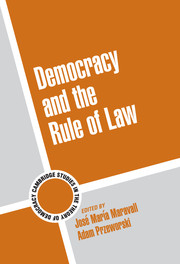Book contents
- Frontmatter
- Contents
- List of Contributors
- Acknowledgments
- Introduction
- Part I
- Part II
- Part III
- 9 Courts as an Instrument of Horizontal Accountability: The Case of Latin Europe
- 10 Rule of Democracy and Rule of Law
- 11 The Rule of Law as a Political Weapon
- 12 The Rule of Law and the Problem of Legal Reform in Michel de Montaigne's Essais
- Author Index
- Subject Index
12 - The Rule of Law and the Problem of Legal Reform in Michel de Montaigne's Essais
Published online by Cambridge University Press: 09 November 2009
- Frontmatter
- Contents
- List of Contributors
- Acknowledgments
- Introduction
- Part I
- Part II
- Part III
- 9 Courts as an Instrument of Horizontal Accountability: The Case of Latin Europe
- 10 Rule of Democracy and Rule of Law
- 11 The Rule of Law as a Political Weapon
- 12 The Rule of Law and the Problem of Legal Reform in Michel de Montaigne's Essais
- Author Index
- Subject Index
Summary
The nature of the law – in the sense of both customary human practices and positive, written law – is a central theme in Montaigne's Essais, though, like any other major subject in his work, it is difficult to present systematically without imposing a somewhat arbitrary order on the text. There were basically three dimensions in which Montaigne developed this subject: the first one was the broad anthropological reflection on the nature of social norms and moral conventions within human societies, no doubt the best-known aspect of his contribution to this issue and one that is generally regarded as distinctly representative of his skeptical approach. The second dimension was the devastating critique of contemporary French legislation and of the judicial machinery responsible for administering it – a reality Montaigne was intimately associated with in his capacity of conseiller first, between 1554 and 1557, at the Cour des Aides de Périgueux, and then, from 1557, at the Parlement of Bordeaux until his decision to sell his post in 1570. Finally, the third dimension was the evaluation of the impact of the Reformation and of religious conflict upon the French legal order, a retrospective assessment that Montaigne attempted at various points in the Essais but which was more fully developed in the 1588 edition of the work (the one that contains book III), published when the prospect of peace and of a durable settlement with the Protestants under Henry of Navarre was finally in sight.
- Type
- Chapter
- Information
- Democracy and the Rule of Law , pp. 302 - 316Publisher: Cambridge University PressPrint publication year: 2003



